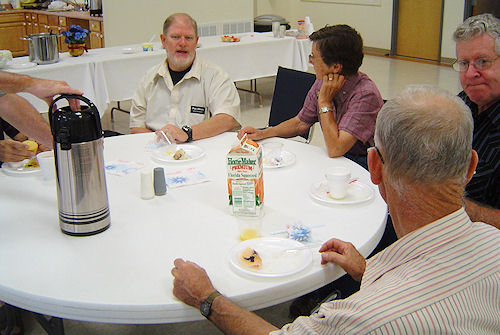
The reason relates to recent historical hurricane events. We saw the results of Hurricane Ivan and then Hurricane Katrina only after the fact. Insurance companies became concerned with hurricane liability. They began to reduce their liability by limiting wind damage coverage in their policies in South Baldwin County. Then they began to terminate house insurance when a company felt it had too much exposure with property covered in hurricane prone areas. Translation? If you live close to the Gulf, you might have serious insurance procurement problems. AIUA, the insurance companies’ wind pool, has historically covered hurricane losses for those companies that do not offer wind and hail coverages. All companies sense a need to reduce liability by moving their “risk lines” from the beach to inland. Wind and hail damage may be covered with higher deductibles, along with higher premiums.
Owen explains, “What they did was begin to shift the ‘risk lines’ to the north of the beach communities. The rationale was simple. The closer you are to the Gulf, the more risk you have from hurricanes. We saw an initial shift to Highway 98 and south as the demarker of significant risk. Now that risk line is at County Road 32 and south. You can see the pattern of risk estimates moving toward I-10. The bottom line is that everyone south of I-10 is in for higher insurance premiums at some point. Depending on the company, insurance for home and wind damage may or may not even be available! What we are seeing is, people having insurance, are being canceled or ‘insured down’ to reduce risk.”
But there is an additional factor that Owen outlined, “This is a double whammy since people are losing coverage for homes when it comes to hurricanes, but when a household is dropped, the local insurance agent that has been the point of contact for insurance, sometimes for many years, loses a customer that cannot be replaced. Indeed, often car insurance policies and life insurance policies are lost to the local agent when a company elects to limit its hurricane liability by canceling coverages. It is an indirect effect, tragic for both home owner and agent as household associated products migrate to other agents and other companies,” Phil Owen explained to the July meeting of Zion Lutheran Church’s “Men’s 710,” a breakfast and speaker fellowship meeting in Silverhill.
Owen, leaving his short-lived “retirement,” began working with Southern Alabama Agency located in Gulf Shores. Lloyd's of London through this agency is addressing specific insurance needs, the needs of those who are losing house insurance or experiencing reduced coverage. “You see,” Phil notes,” house insurance often includes other structures and contents--the policy is typically a ‘package,’ and often cannot be customized for specific household needs. Lloyd's of London does not ‘bundle’ things into a package. The homeowner does not buy what is not needed. Unlike other insurers, Lloyd's is not typically concerned with credit rating, and use of claim history in the underwriting process is ‘more reasonable.’”
The focus of Owen is not just with the insurance consumer, but also with those long-term agents that have been caught in the middle with this insurance policy squeeze. Owen works with agents whose companies have jettisoned house insurance. The agent is enabled to continue working with clients with products that are available, and at the same time is able to tap into Lloyd's of London unbundled services to fill in the uninsured spots for a given household. The process of initiating coverage is relatively simple, since Lloyd's uses “Google Earth” to identify the house and determine the specific mileage of the home from the Gulf or from Mobile Bay. “Rates are directly calculated based on that Google mileage estimate,” Owen reported.
Other agents have found that they can refer to Owen for help in these house insurance problems, and often Owen can provide a supplemental product which will allow the original agent to maintain his long-term client relationship. “I really feel good about this supplemental strategy. I help people and other agents and I am not their competitor. The agents come to me. I develop the product which the agents convey to their clients.”
In responding to numerous questions from the audience, Owen reported some simple facts. “If there is money to be made, standard insurance companies will be there to provide an insurance product. After all, 75% of the U.S. populations lives relatively close to the coastlines. But they are not going to lose money.” “Companies do band together for insurance of one another in this thing called ‘reinsurance.’ There seems to be a multi-state risk determination that any property south of I-10 for the Gulf states, will have higher cost insurance.” “Legislators are not going to force companies to lose money in writing insurance. ‘It ain’t going to happen.’”
Phil Owen may be contacted at (251) 945-6666.





